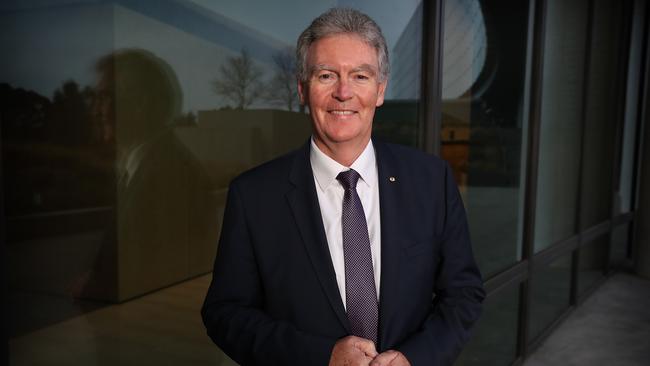Lack of federal resources impair fight on foreign threats
Intelligence agencies are fighting growing foreign interference threats “with one hand tied behind their backs”, national security sources say.

Australian Federal Police and intelligence agencies are fighting growing foreign interference threats “with one hand tied behind their backs”, national security sources say.
The Australian has been told frontline officers believe it would take 18 months to mount a prosecution under new foreign interference and espionage laws introduced last year, because of personnel and budget constraints.
Police and security agencies are yet to make any arrests under the laws, which passed more than a year ago, despite what ASIO boss Duncan Lewis described an “unprecedented” wave of espionage by foreign actors. The laws introduced new offences targeting foreign interference in Australia’s political processes, sabotage, treason and the theft of trade secrets on behalf of foreign governments.
A national security source told The Australian: “Yes, we’ve got the espionage and foreign interference laws through parliament, but we have not adequately resourced our people in the field to counter the espionage and foreign interference threat, which is a leviathan and the worst it’s ever been. Law enforcement and intelligence at the coalface are fighting with one hand tied behind their back.”
Another senior source backed the claim, saying agencies needed to be sufficiently resourced to “start putting people behind bars”.
The government lifted national security resourcing by $34.8 million over four years in the 2019-20 budget, with the funding spread across ASIO, AFP, AGD, Office of the Director of Public Prosecutions and the Department of Foreign Affairs and Trade.
The AFP declined to detail the resources it had dedicated to enforcing the new espionage laws, while Attorney-General Christian Porter’s office confirmed just eight people had been tasked to work on the government’s new Foreign Influence Transparency Scheme.
The Attorney-General’s Office was allocated $7m over three years to run the scheme, which requires those working on behalf of foreign interests to declare affiliations or face jail terms of up to five years.
The director-general of the Australian Security Intelligence Organisation, who will retire in September, said the agency was in a game of “cat and mouse” with the nation’s adversaries.
“It’s constant. Every day there is a discovery. Some of them are more alarming than others,” Mr Lewis said. “The number of investigations going on today is higher than it has ever been. We are busy, we are very, very busy.”
He warned that the espionage threat showed no sign of abating, with attempted foreign interference, including cyber-attacks and traditional spy craft — as well as unwelcome influence within Australia’s political system — now widespread.
“It is an unprecedented level of activity … it’s not visible to most people,” he said.
“It’s not peculiar to Australia, I might add. This is a direct result of globalisation, where you have mass movement of people, goods and ideas. And in the case of ideas they move instantaneously around the globe.”
Introducing his new espionage and foreign interference laws into parliament in late 2017, then-prime minister Malcolm Turnbull cited moves by the Chinese Communist Party to “interfere with our media, our universities and even the decisions of elected representatives right here in this building”.




To join the conversation, please log in. Don't have an account? Register
Join the conversation, you are commenting as Logout